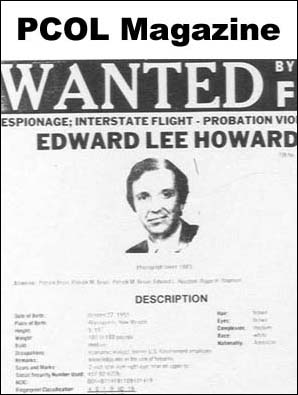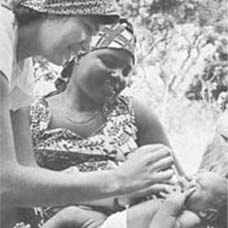
Mysterious life, death of Edward Lee Howard
Mysterious life, death of Edward Lee Howard
By Joshua Paul Lenner
HQ AIA/HO
Lackland AFB, Texas
On July 12, Edward Lee Howard-the only American intelligence agent to defect to the Soviet Union-was found dead with a broken neck in his Russian dacha.
At least that's what an anonymous "family friend" told the Washington Post. Contacted by the Post, the CIA would only confirm that it received unconfirmed reports that Howard had "passed away."
Meanwhile, and equally mysteriously, when questioned regarding the Post article, SVR officials (SVR is the KGB's most recent incarnation) responded only that they had "no such information."
Russia's state news service, however, RIA-Novosti, did manage a quote from an unnamed "Russian foreign intelligence officer," who claimed to have known Howard personally and suggested, cryptically, that the Post's version of his death "was supplied by the U.S. special services." The man gave RIA no further information as to what the real version of
Howard's death might entail, but added that it was in the wishes of the former CIA case officer's family and friends that he be buried without "noise or hullabaloo."
Upon reading his prominent obituary in the Post and New York Times, it's likely many Americans found it difficult to remember just who Mr. Howard was. They were also probably curious as to why it's so difficult to determine if, how, and (depending on how) why he died.
Though sensational in its time, Howard's case is often lumped together with a slew of others that won the year 1985 the sobriquet "year of the spy." It's also often overshadowed by the more scandalous stories of Aldrich Ames and Robert Hanssen. Yet, particularly in light of his mysterious demise, Howard's is a story that deserves to be told. After all, until just this July he was known by an informed few as "the spy who got away."
In 1985, a 33-year-old former spook named Edward Lee Howard shocked the American intelligence community by evading FBI surveillance teams and defecting to Russia.
Howard had applied to the agency in 1980. An ideal candidate, he was 29, married, well-traveled, and well-educated-with an MBA from American University in Washington.
Howard was also a former boy scout, altar boy, and Peace Corps volunteer. He was tri-lingual and he already held a top secret security clearance from work with the Agency for International Development. A background investigation turned up nothing more than some past drug use, and in January 1981, he was hired by the CIA's Directorate of Operations (a.k.a., the Clandestine Services).
Howard was sent to the Farm, a secret CIA boot camp at Camp Peary, Va., where he learned what spooks and spy-novelists call tradecraft: the recruitment of assets, the use of dead drops, techniques associated with counter surveillance and evasion, etc, as practiced by the CIA. In a hint of things to come, Farm instructors noted that Howard had a knack for counter surveillance. In the fall of '81, Howard's wife, Mary, joined him at the CIA and she too was trained for clandestine work.
By late 1982, things were looking good for the Howards. Upon graduating the Farm, Edward had been assigned to a desk in the East German section of the Agency's European division. The EUR was a decent posting with good career potential, but soon afterward the couple was invited to fill a vacancy in the elite Soviet European division -then unquestionably the Agency's most prestigious posting. The couple eagerly accepted and began instruction in the SE's techniques, procedures, and assets: the ins and outs of the Agency's most secretive operations.
But, just before the couple was scheduled to depart for Moscow, things suddenly fell apart. A routine polygraph indicated Howard had been "deceptive" concerning his past drug use, says CIA spokesperson Patti Volz, and worse, she adds: it suggested a history of petty theft. A series of further tests were read to confirm that Howard was unfit for clandestine service1, and on 2 May 1983, he was unceremoniously dismissed from the CIA.
The loss of his job at what appeared to be such a promising moment in his career was devastating for Howard, and his state of mind quickly became a matter of concern for his superiors in the directorate. Here they had a man who'd been taught the intimate details of the agency's most secretive operations, who'd later been found untrustworthy, and whose fall from grace had likely left him disgruntled.
Their worst fears were confirmed just days after his firing, when Howard made several reportedly drunken phone calls to the American Embassy in Moscow. In a rather childish act of vengeance, Howard used a KGB-monitored direct line he'd learned of in SE training, exposing his would-be supervisor there as a CIA operative.
The agency was now, understandably, very concerned. Efforts were made to get Howard some counseling, but he was beyond consolation-particularly by agency psychiatrists who, as he wrote later in his memoirs, "seemed far more interested in limiting my potential damage to the CIA than in helping me."
The couple moved back to New Mexico, where Edward had grown up, and tried to start life anew. But Howard's drinking became destructive. He hit rock bottom in February 1984, when a drunken brawl landed him in jail for assault with a deadly weapon. The charges were later reduced to aggravated assault, but Edward had become a felon.
Howard's real trouble began, however, when he was indirectly fingered by the Soviet defector Vitaly Yurchenko as an agent of the KGB. Yurchenko, himself a KGB colonel who had defected in August of 1985, told his CIA debriefers of a KGB asset codenamed "Robert."
Though Yurchenko insisted he had never seen or spoken to this mysterious Robert, he had two critical clues for CIA counterintelligence officials: 1) Robert was a CIA man who had been slated for posting in Moscow, but taken off the assignment. 2) Robert had met with senior KGB officials in Austria in the fall of 1984. Yurchenko's testimony was extraordinarily timely, as only months before the CIA Moscow station chief had expressed concern that his work was being compromised.
A major operation had been blown, a case officer had been exposed and expelled for espionage, and a key asset, Russian stealth technology researcher Adolf Tolkachev, had been convicted of espionage and sentenced to death.
The ensuing investigation quickly focused on Howard, who was apparently the only officer recently pulled from a Moscow posting, and who had visited Austria with Mary in September 1984. The FBI was brought on to the case and began watching the Howards in New Mexico. A short time later, a warrant was secured to tap the Howards' phone.
Yet the Howards were not your typical couple and proved a challenge for the bureau. They'd been extensively trained to thwart the very techniques its agents now employed. A month after Yurchenko's damning testimony, and still lacking enough evidence to arrest Edward, the FBI decided to confront him directly.
He agreed to some questioning but revealed little of substance. Surveillance was stepped up. Then, Sept. 20, 1985, Howard walked up to a member of a surveillance team and indicated that he was ready to talk. He said he simply wanted to get a lawyer first, and a meeting was scheduled for the following week. The following night, however, Howard disappeared.
As the couple drove home from a dinner out, Howard later explained, he leapt from the car as Mary slowed to turn a corner. He left a dummy made from stuffed clothes and an old wig stand in his seat to fool the pursuing agents, and fled to Albuquerque where he took a plane to New York.
Once at home, Mary placed a call to a number she knew would reach an answering machine, and played a pre-recorded message from Edward to fool the wire tap and buy her husband more time-all tricks they'd learned at the Farm. From New York Howard flew to Helsinki, and there he walked into the Soviet Embassy, offering information in exchange for protection.
Howard maintained his innocence until his death. He only fled, he said, because he could see the agency had chosen him to fill Yurchenko's profile and wanted a scapegoat. He insisted he'd refused to divulge anything of real importance in exchange for his Soviet protection.
He even took his case to Russian state television, where in a 1986 interview he claimed to love America and insisted that he'd never done anything to harm his country. Nonetheless, Edward Lee Howard joined the ranks of Kim Philby, Guy Burgess, and Donald Maclean-infamous western diplomatic and intelligence officials who went against what Howard's biographer calls "the normal flow of traffic" and defected East.
Howard was the first, and last, American to do so, and his dramatic escape made him a source of embarrassment for both the CIA and FBI. Of course, each of these organizations would eventually find they had much bigger moles in their ranks-in light of which, Howard's claims of innocence may not have been as outrageous as they once seemed.
Howard's father once told the New York Times that the CIA "might be playing some strange games" with his son. Others have speculated that Edward was an extraordinarily deep-cover double-agent. FBI officials have publicly dismissed the idea, however, and one struggles to imagine a role for Howard so important that both the CIA and FBI were willing to endure the public scrutiny and humiliation his escape brought with it.
Even still, the dubious circumstances under which suspicions centered on Howard suggest his case was never as open and shut as the agency once believed.
Five days after Yurchenko put the Americans on Howard's trail, the Russian himself shocked the Western intelligence community by re-defecting to Moscow. He was rewarded with an instructor's post (though without access to classified materiel) in a KGB training school.
His American interrogator, moreover, had been none other than future agency nightmare Aldrich Ames, and Ames' bank records show payments suggesting that by this time he'd been working for the KGB for several months.
Could Howard have been innocent? A convenient scapegoat for botched or betrayed operations in Moscow? It seems unlikely. A more plausible explanation might be that he was a minor asset betrayed skillfully by the Yurchenko-Ames team to shore up Ames' position within the Agency. Similar betrayals have long been a part of the intelligence game.
The practice's original advocate was the infamous World War I German spymaster Elsbeth Schragmueller, who may have done the same thing to an inept but later romanticized agent named Mata Hari. In industry terms then, Hari and Howard might have been "sacrificed"-though the similarities end there as Hari failed to escape and was executed.
And this brings us back to the subject of Howard's own death. If, as the Post's anonymous informant suggests, Howard's body was found with a broken neck, could he simply have fallen? Perhaps he was tipsy from one of his notorious bouts with drinking. Yet Howard had almost certainly outlived his usefulness to the Russians. In 1991, a Washington Times article noted that he'd lost his once round-the-clock KGB protection and feared he might be turned over to U.S. authorities for prosecution.
As Russia moves closer to NATO and the West, might this have been a botched attempt to seize and deliver him to the Americans? Indeed, in light of the inventiveness of his escape, it's tempting to read into the confusion surrounding his death the possibility that it's all a sham. Perhaps he's alive, well, and plotting a return to the West after scrutiny of his supposed death has died down.
In death, it seems, Howard has proven as enigmatic as he was in life.








